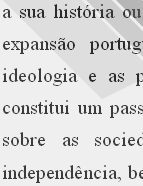

................................
The efficient work of the colonial ideology led to the establishment of colonial matters as 'specialties' exclusive to the men who were part of and trained by specific institutions, managed by political leaders. The Escola Colonial, called the Escola Superior Colonial [Colonial Higher School] (ESC) in 1927, transformed in 1954-55 into the Instituto Superior de Estudos Ultramarinos [Higher Institute of Overseas Studies], witnessed changes to its programmes according to the development of the colonial policy, which also guided the establishment of the Junta das Missões Geográficas e das Investigações Coloniais [Board of Geographical Missions and Colonial Research] in 1936, restructured in 1943 (and again in 1973), with the aim of giving "scientific research in the colonies (... ) a new boost [contributing] to the progress of the colonisation technique and policy" (Da Comissão de Cartografia [Of the Cartography Committee]..., 1983).
The most substantial part of the studies devoted to overseas featured in publications directed by state bodies, such as the Boletim [Bulletin] of the AGU or the journal Estudos Coloniais [Colonial Studies] of the ESC, which sought to establish the relationship between scientific knowledge and colonial management. This did not prevent other (authorised) publications that performed an effective service to the colonial state. Such was the case of the work Antropófagos [Anthropophagi] (1947), where Henrique Galvão revealed the congenital savagery of the Africans. The idea of the "anthropophagous negro", trivialised without limits through the most varied means of dissemination of the image and writing, aimed at children, adolescents and adults, became a structural element of the Portuguese imaginary.
But the state seemed to have renounced a portion of its monopoly over colonial knowledge, authorising some degree of autonomy in 'neutral' spaces such as geography, biology, botany, zoology, in other words, in the fields of knowledge that appeared to escape the burden of ideology. This situation, coupled with the international context generated by the end of World War II (1945), the Bandung Conference (1955) and the condemnation of colonialism, fostered a reflection on the 'endemic' fragility of Portuguese scientific research, focusing on geography, in the wake of the scientific importance of Orlando Ribeiro.
